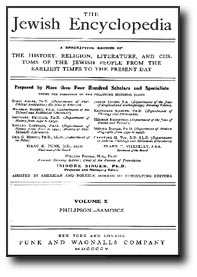| Chapter 16: Jewish Supremacism, Pg. 5 of 12 |
ORDER NOW! |
It astonished me to read such unmitigated hatred from the chief writings of the Jewish religion. It was obvious that these quotations were all authentic, because the copies I read were published by Jewish organizations. I could not find any rational explanation for such writings being in the Jewish sacred books; in fact, it became clear to me that most Americans don't know such writings even exist.
These quotes were hard for me to believe, as they will be for many readers. However, if anyone doubts them, an easy way to verify the Talmud's anti-Gentile is by reading the Jewish Encyclopedia. In its article "Gentiles," it makes very clear the Talmud's hatred toward non-Jews. Under the subtitle "Discrimination against Gentiles," on pages 617-621, it freely discusses the Talmud's attitude. Here are some excerpts:

. . .they held that only Israelites are men, . . . Gentiles they classed not as men but as barbarians. (B.M. 108b). . . Another reason for discrimination was the vile and vicious character of the Gentiles. . . . "whose flesh is like the flesh of asses and issue is like the issue of horses . . ." The Gentiles were so strongly suspected of unnatural crimes that it was necessary to prohibit the stabling of a cow in their stalls (Ab. Zarah ii. 1). . ."The Torah outlawed the issue of a Gentile as that of a beast.. . . " The almighty offered the Torah to the Gentiles nations also, but since they refused to accept it, He withdrew his shining legal protection from them, and transferred their property rights to Israel. . . the presumption is that the Gentile obtained possession by seizure, . . . The property is considered public property, like the unclaimed land of the Desert.1
The 1907 edition of the Funk & Wagnall's Jewish Encyclopedia mentions a quotation of Rabbi Simon Ben Yohai (a giant of Talmudic literature) that is "often quoted by anti-Semites." The quotation reads: "Tob shebe-goyim harog" - "The best of the Goyim is to be killed." It says that the rabbi's utterance is a result of persecution, describing this anti-Gentile statement as a result of a rabbi "whose life experiences may furnish an explanation for his animosity." Yet the passage goes on to say, "In the connection in which it stands, the import of this observation is similar to that of the two others: 'The most pious woman is addicted to sorcery'; 'The best of snakes ought to have its head crushed.' "2
The Talmudic quotations I reproduce here are by no means taken out of context. It is true that the Talmud is compiled from many writers and has many "commentaries" throughout. It also sometimes actually has disputes on certain issues. However, there is no mistaking the decidedly anti-Gentile tone that dominates it throughout. The exhortation that "the best of Gentiles should be killed," for instance, is found in at least three sections.
Imagine the reaction if a prominent Christian pronounced that "the best of the Jews should be killed." Would not such a statement be forcefully condemned? Imagine the media opprobrium that would be heaped on the offending words and its author - and rightfully so. Perversely, if one exposes the intolerance in the Talmud, he is the one likely to face accusations of religious prejudice and intolerance.
When I first sought to read the Talmud, I noticed a strange thing. I had a hard time finding a copy. It is not sold in bookstores, and most libraries don't have copies. Admittedly, the Talmud is a few times the size of the Bible, but certainly, in mass quantities, the Talmud could be printed for a nominal cost, much like the Bible is, on thin paper and inexpensively bound volumes. As the most holy writ of the one of the world's major religions, the interest in it must be high. Why then, must one usually go to synagogue or pay hundreds of dollars for an original Soncino edition? One must ask why it is not readily available for the public to read. The answer is probably found in the fact that the Jewish organizations that oversee such writings don't want them widely read, and when one reads the Talmudic books, one can understand their fear.
As an idealistic teenager, I was totally unprepared for this darker side of a faith that I had always respected. My impression had been that the Jewish faith had no animosity toward Jesus Christ. I was always told that they had much respect for Him as a prophet or at least as a great teacher but simply did not accept him as the Messiah. It disturbed me to have come across violently obscene descriptions of the Savior and of Christians in the Talmud. Among other things, Christ is described as a charlatan, a seducer and an evil-doer. It accuses Christ of having sexual intercourse with his donkey 3 and it describes the Virgin Mary as a whore.4
When I first read extensive sections of the Talmud, even with the Jewish-published translations in front of me, I did not want to believe they were authentic. I approached a Jewish acquaintance, Mark Cohen, and gave him a page of these quotations. He seemed equally upset by them. By the look on his face, I knew instantly that he was completely unfamiliar (and unsympathetic) with this Talmudic writ. He offered to ask his rabbi about their authenticity. The rabbi confirmed that the quotations were genuine but claimed that those views were not currently held by most Jews of today.
- Funk And Wagnalls Jewish Encyclopedia. (1907). Gentile: Discrimination Against Gentiles. p.617-621.
- Funk And Wagnalls Jewish Encyclopedia. (1907). Gentile. New York. p.617.
- Talmud, Sanhedrin (1935). Soncino Edition. 105a-b. p.717.
- Talmud, Sanhedrin (1935). Soncino Edition. 105a-b. p.726.